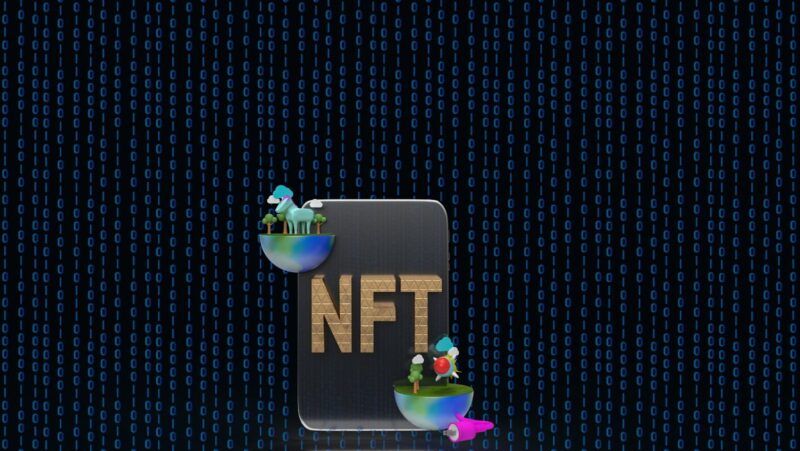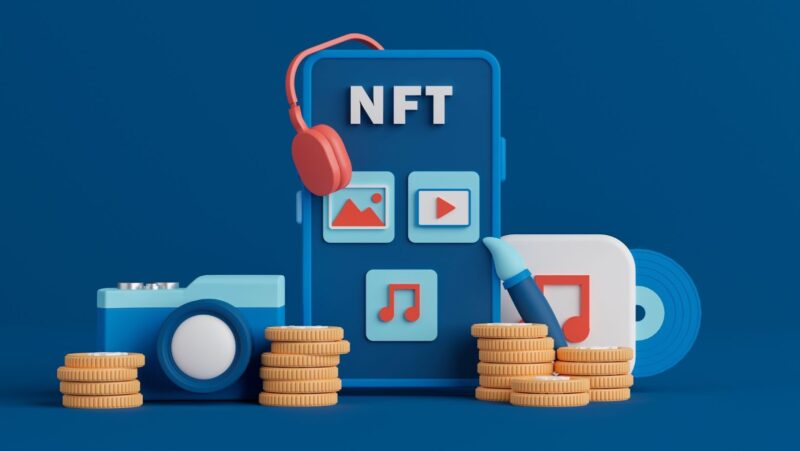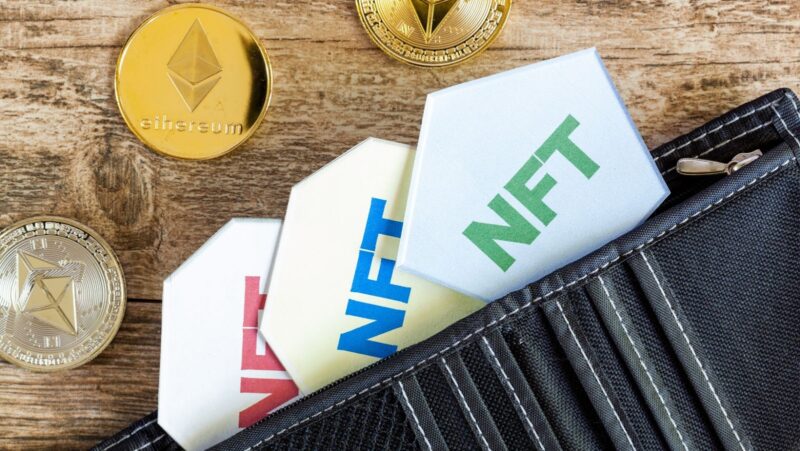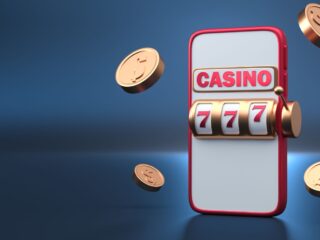
Blockchain technology can revolutionize gaming, including the design and development of games, their monetization and distribution, player experience and ownership, and the security of games. This is because blockchain based solutions guarantee secure transactions without intermediaries. For example, square Enix President’s New Year letter mentioned blockchain 14 times, demonstrating its potential to revolutionize gaming.
In this article we will explore the potential applications of blockchain in gaming that may significantly change how developers create, monetize and distribute video games and affect player experience and interactions. We will also look into how blockchain can provide a more secure environment for gamers by enabling them to take control of their data and game ownership. Finally, we will examine how cryptocurrency can facilitate different types of blockchain based game models and incentivize players for engaging with virtual services.
What is Blockchain?
Blockchain is a distributed ledger technology that enables a wide variety of applications. It’s a decentralized, secure, and immutable ledger that stores and transmits transaction data in a distributed and secure manner. With its potential applications in gaming, the technology has become increasingly popular.
Square Enix President’s New Year Letter Mentions Blockchain 14 Times, highlighting the immense potential of this technology in the gaming industry. Let’s look deeper at blockchain and how it can be used in gaming.
Definition
Blockchain is a distributed ledger technology that creates tamper-proof and trustless digital records. It stores and verifies an ever-increasing assortment of data, including cryptocurrency transactions and gaming assets on a shared public ledger. In essence, Blockchain offers an immutable database infrastructure where users can securely exchange information without intermediary authorities.
It protects against double-spending or malicious attack on currency holders while participating in gaming transactions. This can be done through automated protocols such as smart contracts, coins (tokens), or ownership tokens that exist only within the blockchain $USD environment. Furthermore, thanks to blockchain technology’s distributed algorithm system, players have full control over their assets with pure trust to validate their transactions directly between peers in near real-time.
While there are numerous potential applications of Blockchain in gaming, Square Enix President Yosuke Matsuda recently mentioned the technology 14 times during his 2020 New Year letter emphasizing its importance for “the next generation of game platforms” . The term is broadly used to describe a move away from centralized services for gaming economics towards more inclusive innovation that enables greater participation across all levels of game play by providing new forms of value creation and trading systems outside of existing banking structures — this further adds tangible benefits from reduced cost operations servicing wide open platform economies .
Benefits
There are numerous potential benefits that blockchain technology can offer to the gaming industry. By harnessing the power of distributed ledger technology, the gaming industry can make their data more secure, efficient, and transparent. Blockchain also offers a way to incentivize players, rewarding them in tokens or cryptocurrencies for their participation.
Other potential benefits of blockchain technology in gaming are:
- Increased speed and reliability: A distributed platform like blockchain makes transactions faster and more reliable.
- Enhanced security: Blockchain makes it difficult to tamper with data, enabling an environment of trust between gamers and developers.
- Improved scalability: The decentralized nature of blockchain allows games to scale better with increased player demand.
- Accessibility: Blockchain enables gamers greater access to content, resulting in a larger game market.
- Fractional ownership benefits: Fractional ownership capabilities enable gamers to invest small amounts into assets and assets into games that single players or companies cannot control. This could open up whole new worlds of opportunities for gaming developers and publishers and enable users from around the globe to participate in game economies without additional investments or fees.
- Smart contract capabilities: Smart contracts on the blockchain enable virtually instantaneous trustless transactions between parties within a game’s ecosystem which can provide smoother gameplay experiences for users, yet still maintain data liquidity needs for publishers & developers.
Potential Applications of Blockchain in Gaming
Square Enix President Yosuke Matsuda recently expressed his enthusiasm for the potential applications of blockchain in gaming. Furthermore, Matsuda mentioned blockchain fourteen times in his New Year’s letter. This indicates that Square Enix is taking blockchain technology very seriously.
In this article, we’ll explore some potential applications blockchain has for gaming.
Decentralized Game Currencies
The focus of blockchain integration to enable success in the gaming industry is on the development of decentralized games and game currencies. Decentralized game currencies allow gamers to own unique tokens that do not require centralized third-party services, such as banks or credit card companies, to authenticate each transaction. With authentication provided by a blockchain ledger for each game, individual gamers can purchase digital assets and transfer them between different games. Transactions are then recorded and secured within a blockchain. As a result, players can buy, store, use and trade their digital assets more securely and conveniently.
Furthermore, due to low transaction costs associated with decentralized gaming currencies, developers benefit from an increase in the speed of transactions and reduced fees when using cryptocurrency as a form of payment rather than traditional fiat currency payment methods. Allying with a bank or a credit card company comes with additional costs that could reduce developer profits if deposited as fees instead of revenues. Therefore, implementing Blockchain-based decentralized game currencies can benefit developers and gamers by eliminating the need for escrow services that charge fees on purchased items through centralized third-parties like PayPal or Apple Pay.
In this way participants who choose to participate in decentralized networks benefit from greater security levels at no cost while maintaining their privacy rights regarding ownership of non-fungible tokens representing digital assets acquired in gaming experiences thanks to public key encryption which is embedded into every transaction through the implementation of decentralized gaming eco systems powered by blockchain technology.
In-Game Asset Trading
One of the main potential applications of blockchain technology in gaming is in-game asset trading. Blockchain technology can create a digital asset exchange for players to buy, sell, and trade in-game items such as weapons, armor, and other objects. Blockchain allows game developers to build a secure online marketplace which players can use to safely transact with each other. Through smart contracts, players could securely receive the purchased digital assets from the seller with confidence that they were not tampered with and that they were receiving what was agreed upon.
Another application of blockchain is in creating an immutable record of ownership. Using this technology, game developers can make sure each item originated from its correct place by assigning a unique identifier to each item or asset using tokens on the blockchain ledger. This will prevent counterfeit assets from entering circulation within the game and enable developers to store more information about an asset than its name — such as its history (past owners), quality, condition etc. These features ensure trust and safety among players, increasing player loyalty and engagement while ensuring a fair playing environment free from fraud or manipulation.
Digital Identity Protection
Digital identity protection is one of the most important applications of blockchain technology in gaming. Blockchains were originally developed as a secure, distributed ledger that prevents fraudulent transactions, and this can be applied to the digital identities of players and NPCs (non-player characters). The blockchain allows for the emergence of digital identity ‒ previously only possible with complicated methods and multiple documents.
Such a system creates an extremely secure environment. Data stored on a blockchain is difficult or impossible to modify or tamper with, making it ideal for protecting digital identities from malicious hackers or bad actors. In addition, blockchain-based solutions can help prevent identity fraud, especially in online video games with microtransactions requiring extensive verification of buyers’ willingness to pay, making in-game purchasing safer and more efficient.
Blockchain can also enforce secure cross-platform transactions and exchanges between different vendors within gaming networks. Having verified transactions on the platform helps prevent fraud while allowing game creators to design complex games with new layers of monetization opportunities without relying on external services. Finally, Google Play Integration can be enabled using blockchain technology, introducing new ways to buy items securely via micropayment systems like Ethereum or Bitcoin.
Smart Contracts
One of the most promising applications of blockchain in gaming is smart contracts. Smart contracts are computer protocols that enable a game’s rules, policies and economic systems to be encoded into an immutable and distributed ledger. These protocols enable the creation, execution and management of digital assets such as in-game items and currency, allowing users to securely buy, sell, store, trade and manage ownership of these digital assets.
The versatility and power of smart contracts can open up new opportunities for games to offer dynamic experiences such as player-driven economies where players can create their own tokenized assets and manage economies within a game using digital currency with no centralized control. In addition to creating vibrant communities within the game world, this could also help facilitate direct peer-to-peer transactions between players without needing third parties or payment processing fees. Smart contracts can also help gaming companies automate transactions related to royalties or revenue sharing amongst developers, content creators or licensees.
Enhanced Security
Using the Blockchain can significantly increase security in the gaming world. This is because of the distributed nature of Blockchain technology, which makes it almost impossible to hack. Transactions recorded on a distributed ledger or Blockchains are immutable and decentralised, reducing the risk of fraud and hacking. This also prevents users from taking advantage of any loopholes in-game as other gamers will be able to detect malicious behaviour from players more quickly.
As well as this, cryptographic hashing algorithms store each transaction securely on the Blockchain, meaning that all data remains private and secure throughout its time on the network.
Blockchain technology may also revolutionize in-game transactions by allowing players to make cross platform transactions with smart contracts—a contract built into the game’s code (akin to an automated escrow). Through such secure transactions, gamers could purchase items within games more quickly and securely than ever without any third party intermediaries.
Finally, blockchain could allow developers to issue digital assets (such as in-game currencies) that are immutable — meaning they can never be duplicated or manipulated — increasing overall trust between developers and gamers by eliminating fraud or manipulation of data. With this greater trust comes greater confidence, encouraging further engagement between participants within gaming communities all while providing complete anonymity to a user’s identity or activity due their records being kept away from central networks where they can easily be manipulated or stolen.

Square Enix President’s New Year Letter Mentions Blockchain 14 Times
Since Square Enix president Yosuke Matsuda wrote a letter for New Year’s 2020 that mentioned blockchain 14 times, it is clear that the company is looking to explore the potential applications of this groundbreaking technology in gaming.
Blockchain has several potential applications for gaming, from enhancing game economies and incentivizing players to providing an immutable record of players’ in-game progress and allowing distributed applications to run on its platform.
Firstly, blockchain could make game economies more secure and reliable than they are today. By introducing decentralized ledger systems, developers could create a game economy with many new characteristics not found in traditional economics, such as tamper-proof and full transparency concerning transactions process within the economy. Furthermore, this would allow developers to introduce certain features into their games that have not been possible before such as jumpstarting the economy with real-world money or creating fractional ownership of in-game items.
Developers could also use blockchain to provide an immutable record of players’ progress with various games, from achievements achieved in singleplayer mode to competitive leagues held between friends. While current cloud-based solutions offer similar capabilities today, blockchain could make this data almost secure and ensure that cheaters are unable to gain any sort of advantage over legitimate players by tampering with records; Furthermore, blockchain allows for credits earned from one game or platform to carry over into another — creating a unified cross-platform experience for gamers all around the world.
Finally, blockchains can provide appliances for distributed applications (dApps) enabling developers build innovative new types of online games and services on top of these platforms; A plethora of these dApps will soon being launched due Square Enix’s interest above in both Ethereum & Hyperledger combined with Sony’s recent partnership using Microsoft Azure Blockchain services as well – making them frontrunners in this new and exciting industry!
Conclusion
In conclusion, blockchain technology is poised to revolutionize the gaming industry in many interesting ways shortly. For example, it could provide more secure methods of establishing player identity and facilitate trust within a gaming community while enabling better rewards and unique monetization strategies.
In addition, blockchain technology can create provably fair gaming experiences and provide better transparency over the development pipeline of games. Finally, by introducing tokenized assets, players can own rare digital items worth real money and trade them on platform-agnostic secondary markets that any game developer does not own.








